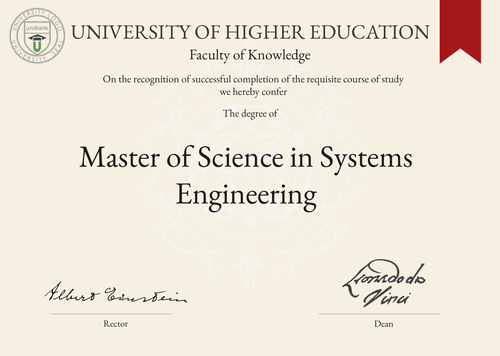
Master of Science in Systems Engineering (MSc in Systems Engineering)
Guide to Master of Science in Systems Engineering Program/Course/Degree
Master of Science in Systems Engineering (MSc in Systems Engineering)

Degree Name:
Master of Science in Systems Engineering
Degree Abbreviation:
MSc in Systems Engineering
Duration Range:
1-2 years
Tuition Range (US, UK, AUS, NZ):
$10,000-$50,000
Overview:
A Master of Science in Systems Engineering degree is a graduate-level program that focuses on the design, development and implementation of complex systems. This degree program is designed to provide students with the knowledge and skills needed to manage and optimize complex systems in a variety of industries, including aerospace, defense, healthcare and transportation.
Curriculum Overview by Year:
- Year 1:
- Introduction to Systems Engineering
- Systems Thinking and Analysis
- Systems Modeling and Simulation
- Systems Integration and Test
- Year 2:
- Advanced Systems Engineering
- Systems Architecture and Design
- Systems Optimization and Control
- Systems Project Management
Key Components:
The key components of a Master of Science in Systems Engineering degree include systems thinking, systems analysis, systems modeling and simulation, systems integration and test, systems architecture and design, systems optimization and control and systems project management.
Career Prospects:
Graduates of a Master of Science in Systems Engineering degree program can pursue careers in a variety of industries, including aerospace, defense, healthcare and transportation. Some common job titles for graduates of this program include systems engineer, systems analyst, systems architect and project manager.
Salary Expectations:
The salary expectations for graduates of a Master of Science in Systems Engineering degree program vary depending on the industry and location. According to Payscale, the average salary for a systems engineer is $81,000 per year, while the average salary for a systems analyst is $68,000 per year.
For a more accurate understanding of salary expectations, you can utilize the Job Sites Search Engine, from our sister site jobRank, which searches over 4,600 job sites worldwide. Make sure to specify not only the job title but also the country you are interested in.Conclusions:
Overall, a Master of Science in Systems Engineering degree is a valuable investment for individuals who are interested in managing and optimizing complex systems. However, it is important to note that the duration, tuition fees, curriculum, key components, career prospects and salary expectations can vary depending on the country and university where the degree is pursued. Visitors can search for where this specific degree (MSc in Systems Engineering) is offered anywhere in the world through the uniRank World Universities Search Engine.
World Universities Search Engine
search for Master of Science in Systems Engineering (MSc in Systems Engineering) and add the Location (country, state etc.) or specific University you are interested in studying at.
Query examples:
- Master of Science in Systems Engineering (MSc in Systems Engineering) United States
- Master of Science in Systems Engineering (MSc in Systems Engineering) United Kingdom online
- Master of Science in Systems Engineering (MSc in Systems Engineering) Australia international students
- Master of Science in Systems Engineering (MSc in Systems Engineering) University of California
- Master of Science in Systems Engineering (MSc in Systems Engineering) University of London tuition fees
- Master of Science in Systems Engineering (MSc in Systems Engineering) University of Sydney scholarships
Share Program/Course
Interesting? Share this program/course/degree info with your friends now.